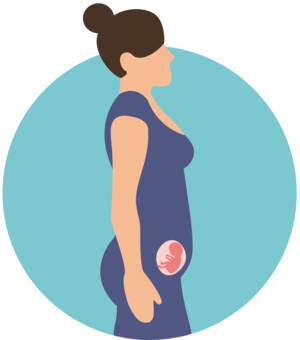Pregnancy at week 17
4-minute read
Your baby
Your baby is growing rapidly, and might be bigger than the placenta now. They weigh about 150g and are about 13cm long - about the length of a nail file.
They are now developing a layer of fat called the adipose layer. This helps them to gain weight and will define their features. The umbilical cord is becoming thicker and stronger. The external sex organs are fully formed so it’s usually possible to see the baby’s gender on an ultrasound.
Their kidneys are also functioning now. The baby swallows amniotic fluid and passes urine about every 50 minutes. Their taste buds are working and they can tell the difference between sweet and bitter. There are tiny lines on their fingers that will develop into their unique fingerprints.
Your baby at 17 weeks
| Length: | 13cm |
| Weight: | 150g |

Your body
Many women have lots of energy at this stage. As the baby moves up in your abdomen you won’t need to go to the toilet as often, and if you had nausea, it is hopefully now a thing of the past.
Increased hormone levels are causing changes to your body. You might notice a dark line forming from your belly button to the top of your pubic bone, called the linea nigra. Your hair should be thicker because it’s not falling out as much.
Changes to your hormones may mean you have a stuffy nose and you might start snoring at night. You can use a saline spray, but talk to your doctor before you use antihistamines to clear your nose while you’re pregnant.
You might notice more vaginal discharge, which you can manage by using panty liners. If the discharge changes colour or is smelly, see your doctor because this could mean you have an infection.
Things to remember
Now might be the time to start thinking about antenatal classes. These are designed to help you and your partner get ready for the labour and birth as well as learn about breastfeeding and how to care for a newborn baby. They are also an opportunity for you to discuss your feelings and meet other people who are going through the same experiences as you.
Antenatal classes are usually offered by hospitals, community health centres or through private organisations. Your doctor or midwife will be able to suggest antenatal classes in your area. Some are free, while for others you may need to pay a fee. There are also antenatal classes online if you can’t travel to one.
Read next

Your pregnancy at 18 weeks
Learn about your pregnancy journey and what is happening to you and your baby.

Speak to a maternal child health nurse
Call Pregnancy, Birth and Baby to speak to a maternal child health nurse on 1800 882 436 or video call. Available 7am to midnight (AET), 7 days a week.
Learn more here about the development and quality assurance of healthdirect content.
Last reviewed: April 2022




